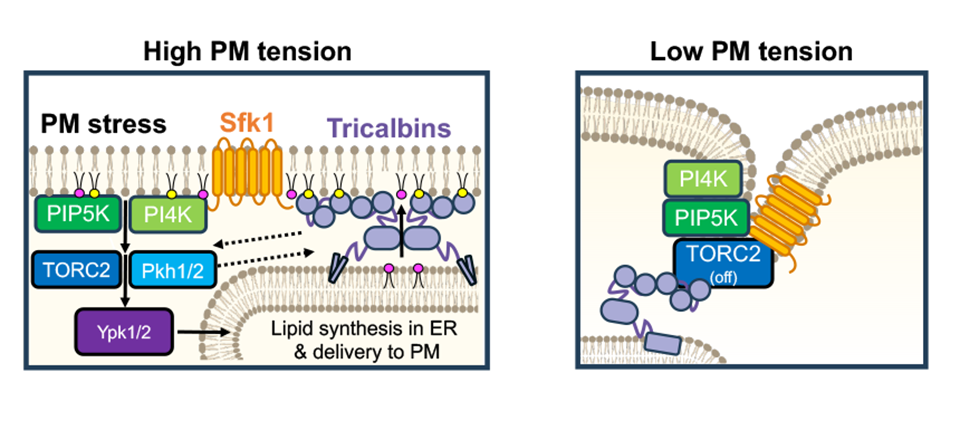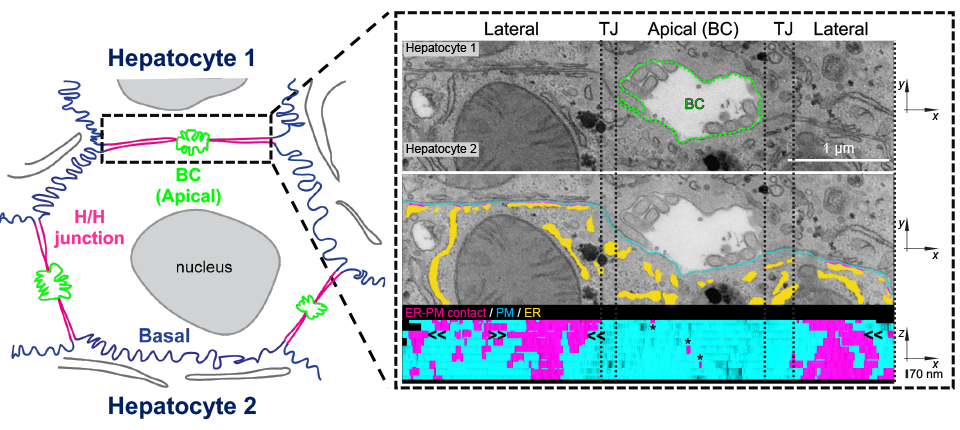Research synopsis
The plasma membrane defines cellular identity and integrity. We are discovering vital roles of phosphoinositide signalling networks and inter-organelle communication in the control of plasma membrane domain organisation, homeostasis, and repair at the molecular, ultra-structural, cellular, and tissue levels.
Phosphoinositide Signalling and Inter-Organelle Crosstalk in Plasma Membrane Homeostasis and Repair:
The plasma membrane must withstand rapid changes in tension upon exposure to mechanical forces and environmental stresses. We are utilising cross-disciplinary approaches (advanced imaging, biochemical, biophysical, structural, and computational) to determine how cells sense and respond to membrane stress and damage. These studies are revealing critical roles of phosphoinositide kinase signalling and non-vesicular membrane lipid trafficking pathways in plasma membrane homeostasis and repair upon alterations in membrane tension. Phosphoinositide Signalling and Inter-Organelle Crosstalk in Epithelial Cell Architecture:
Phosphoinositide Signalling and Inter-Organelle Crosstalk in Epithelial Cell Architecture:
We are uncovering unprecedented roles of phosphoinositide metabolism and inter-organelle communication in plasma domain organisation and function in hepatocytes, polarised epithelial cells of the liver. These studies are also revealing striking alterations in inter-organelle contacts and membrane organelle morphology as novel hallmarks of hepatocyte pathology in the progression of severe liver disease. We expect our investigations will identify new targets and strategies for the treatment of numerous diseases caused by disruptions in inter-organelle contacts and membrane homeostasis.

Selected publications
Funders
UKRI
Research themes
Inter-organelle contacts
Organelle homeostasis
Phosphoinositide signalling
Technology
Molecular cell biology
Electron microscopy
Super-resolution microscopy
Optical biology and spectroscopy
Quantitative lipidomics and proteomics
Membrane mechanics and biophysics
Bioinformatics and computational modelling
People
Collaborators
Frances Brodsky (UCL Biosciences, UK)
Paul Gissen (UCL ICH, UK)
Tamir Rashid (Imperial, UK)
Robbie Loewith (Univ Geneva, Switzerland)
David Teis (Innsbruck Med Sch, Austria)
Florian Fröhlich (Univ Osnabruck, Germany)
Ruben Busnadiego-Fernandez (Univ Med Gottingen, Germany)
Roberto Covino (Frankfurt Inst Adv Studies, Germany)
Nozomu Kono (Tokyo Univ, Japan)
 Close
Close


